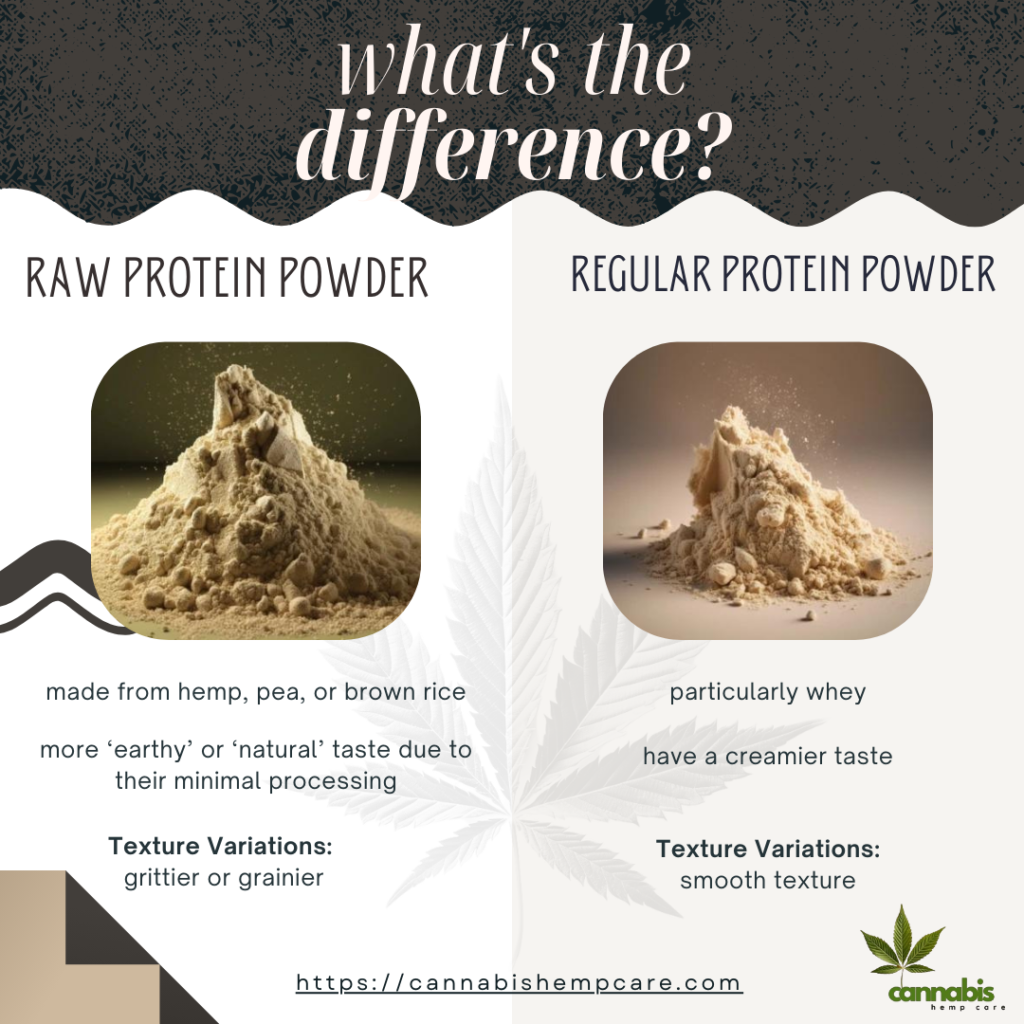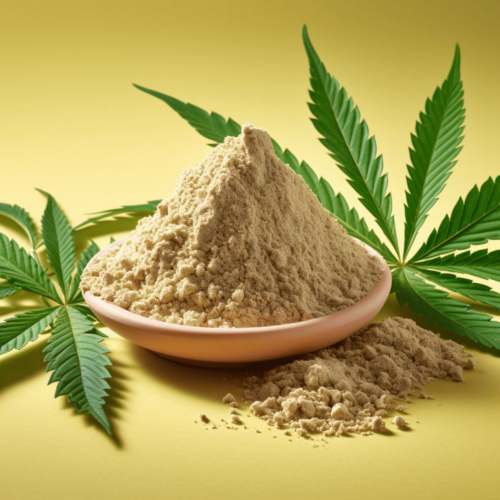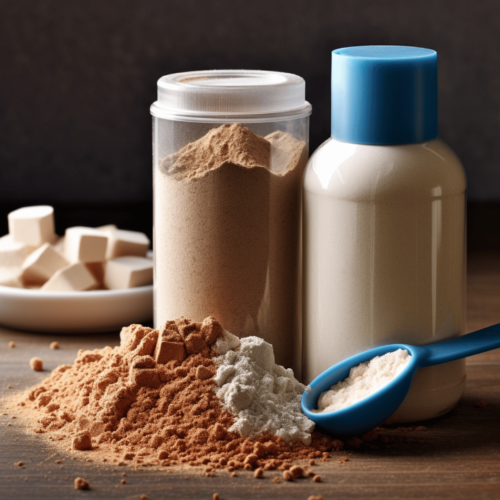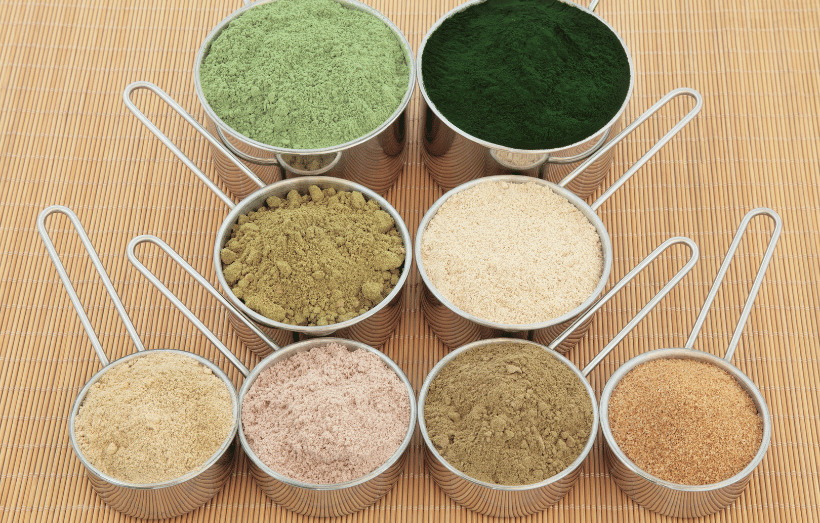In the vast world of protein supplements, the question arises: Is raw protein powder better than regular protein powder? Let’s dive into the science, expert opinions, and relevant research to answer this question.
What’s the Difference?
Raw protein powder, often sourced from plant-based proteins, is made without high-temperature processing, preserving natural enzymes and nutrients. Regular protein powder, like whey or casein, typically undergoes high-temperature processing, potentially reducing the bioavailability of certain nutrients.

Nutritional Differences
Raw protein powders, like those made from hemp, pea, or brown rice, often retain a broader nutrient spectrum, including vitamins, minerals, and fiber, due to the lack of high-temperature processing. A study published in the Journal of the International Society of Sports Nutrition in 2013 highlighted the comparable amino acid profile of plant-based proteins to animal-based proteins.
Regular protein powders, particularly whey, are rich in branched-chain amino acids (BCAAs), essential for muscle growth and recovery. However, the high-temperature processing might reduce the presence of natural enzymes and other beneficial compounds.

Digestibility and Allergies
Raw protein powders can be easier to digest for some individuals due to the preservation of natural enzymes that assist with digestion. A study from Food & Function in 2018 supported the notion that raw proteins maintain digestive enzymes.
Additionally, those with lactose intolerance or dairy allergies may find plant-based raw protein powders to be a more suitable option. The Journal of the American College of Nutrition published a study in 2018 indicating that plant-based proteins could be a viable alternative for those with dairy-related sensitivities.
Taste and Texture
- Flavor Differences: Raw protein powders might have a more ‘earthy’ or ‘natural’ taste due to their minimal processing. In contrast, regular protein powders, especially whey or casein, often have a creamier taste.
- Texture Variations: Raw protein powders can sometimes be grittier or grainier compared to their regular counterparts. This is because they haven’t undergone high-temperature processing, which can smooth out the texture.
Nutrition experts often emphasize the importance of whole food sources of protein. Still, protein powders can be a convenient supplement. According to Dr. Melina Jampolis, a physician nutrition specialist, the choice between raw and regular protein powder should align with individual preferences, dietary restrictions, and specific nutritional needs.
There is no one-size-fits-all answer to whether raw protein powder is better than regular protein powder. Both have their merits and drawbacks. The choice should be based on personal preferences, dietary restrictions, and individual health goals. Always consult with a healthcare professional or registered dietitian when making significant changes to your dietary regimen.
It’s essential to be an informed consumer and do your research when choosing a protein powder. Consider your specific needs, preferences, and the latest scientific research to make an informed choice.

Absorption and Bioavailability
One of the critical factors to consider when choosing a protein powder is its absorption rate and bioavailability. The bioavailability of a protein refers to the proportion of the ingested protein that is absorbed and used by the body. Absorption, on the other hand, refers to the speed at which the protein is absorbed and utilized.
Whey protein, a popular choice for regular protein powders, is known for its rapid absorption rate. This makes it an excellent option for post-workout recovery, as it can quickly deliver amino acids to the muscles. A study published in the Journal of Applied Physiology in 2001 demonstrated that whey protein leads to a rapid increase in plasma amino acids, promoting muscle protein synthesis.
Raw protein powders, often plant-based, may have a slower absorption rate compared to whey protein. This can be advantageous for sustained energy and satiety throughout the day. However, it may not be the best choice for immediate post-workout recovery.
Environmental and Ethical Considerations
Another factor to consider when choosing between raw and regular protein powders is their environmental and ethical implications. The production of plant-based raw protein powders, such as hemp, pea, or brown rice, often has a lower environmental impact compared to animal-based protein powders like whey or casein.
According to a study published in Science in 2018, plant-based proteins have a smaller carbon footprint, use less land, and consume less water compared to animal-based proteins. This makes raw protein powders a more sustainable and eco-friendly choice.
Ethical considerations may also come into play, especially for individuals who follow a vegan or vegetarian lifestyle. Plant-based raw protein powders align with these dietary preferences and offer a cruelty-free alternative to animal-derived protein powders.

Cost and Availability of Protein Powders
1. Traditional Protein Powders: Common and Cost-Effective
- Widely Available: Traditional protein powders, primarily those like whey and casein, are made from milk. They have been around for a long time and are readily available in most grocery stores, health food stores, and online retailers. Due to their widespread acceptance and extensive production, these types of powders often enjoy broader distribution.
- Economical Choice: A 2019 study published in the Journal of the International Society of Sports Nutrition highlighted that whey protein is one of the most researched and commonly consumed protein supplements. Its popularity and mass production often translate to competitive pricing. For example, a survey from Consumer Reports found that you might pay anywhere from $0.50 to $3.00 per serving of whey protein, depending on the brand and quality.
2. Raw Protein Powders: A New Age Alternative
- Growing Popularity: Raw protein powders, often derived from plant-based sources, have seen a surge in demand due to the rise of veganism and a push for more natural, unprocessed products. Brands like Sunwarrior, Garden of Life, and Vega offer raw protein blends derived from peas, hemp, and brown rice.
- Pricing Variances: The cost of raw protein powders can be higher than traditional powders due to various factors. These might include the organic cultivation of ingredients, minimal processing, and fewer preservatives. A study in the Journal of Food Science and Technology in 2017 noted that plant-based proteins while gaining in popularity, might carry a premium price due to these reasons. However, with increased demand and more players in the market, prices for raw protein powders have been gradually decreasing.
- Considering More than Just Price: When weighing the cost, it’s crucial not just to look at the price tag but also to consider factors like nutritional benefits, taste, ethical considerations, and environmental impact. For instance, a raw protein powder might be a bit pricier but could offer unique nutritional profiles, cater to specific dietary restrictions, and align better with personal ethical beliefs.
While traditional protein powders like whey or casein might be more pocket-friendly and widely available, raw protein powders provide a natural, often plant-based alternative that caters to modern dietary needs and ethical considerations. As always, it’s recommended to research and sample different products to find the one that aligns best with personal preferences, dietary requirements, and budget.

Conclusion
Ultimately, the choice between raw and regular protein powder should be based on individual goals and preferences. Consider your dietary restrictions, taste preferences, and specific nutritional needs when making a decision.
For those looking for a quick-absorbing protein to support post-workout recovery, regular protein powders like whey may be a suitable choice. On the other hand, if you prefer a more natural, plant-based option with a broader nutrient spectrum, raw protein powders may be the better option.
FAQs
What are the benefits of raw whey?
Raw whey, derived from milk during the cheese-making process, is rich in amino acids, which are essential for muscle building and repair. It also contains immunoglobulins and lactoferrin, which support the immune system. Additionally, raw whey is a natural source of antioxidants and can help improve the body’s antioxidant defenses.
Is it OK to have whey protein every day?
Consuming whey protein every day is generally safe for most people, as long as it is part of a balanced diet and does not exceed daily protein intake recommendations. The Recommended Dietary Allowance (RDA) for protein is about 46 grams per day for women and 56 grams for men. If you’re unsure about your protein needs, consulting with a healthcare professional or registered dietitian is a good idea.
How long is raw whey good for?
The shelf life of raw whey depends on its form and storage conditions. Liquid whey, a byproduct of cheese production, typically lasts a few days in the refrigerator. On the other hand, raw whey protein powder can last up to two years if stored in a cool, dry place.
Can you refrigerate whey powder?
While it’s not necessary to refrigerate whey protein powder, doing so won’t harm the product. However, it’s essential to ensure the container is sealed tightly to prevent moisture from entering, as it can cause the powder to clump or spoil. A cool, dry pantry or cupboard is typically sufficient for storing whey powder
Is raw whey difficult to digest?
Whey protein is usually easy to digest, as it’s a water-soluble milk protein. However, some people might experience digestive discomfort due to lactose, a sugar present in whey. If you’re lactose intolerant, consider using a whey protein isolate, which contains less lactose than other forms.




































